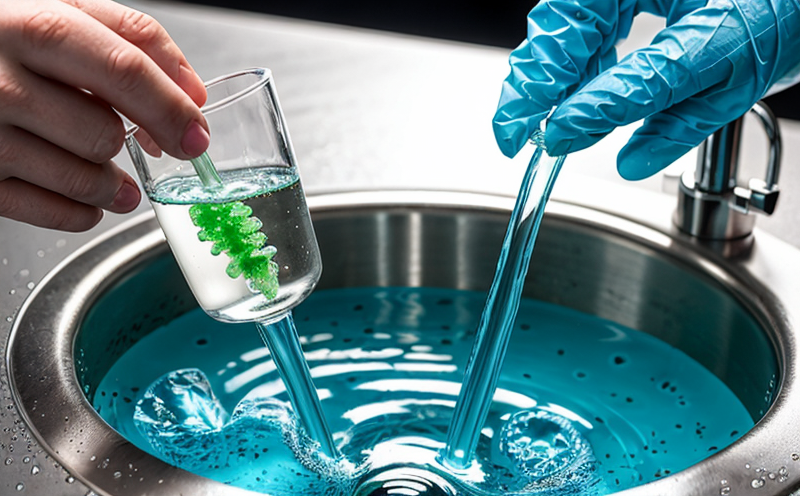APHA 9223 Colilert Enzyme Substrate Coliform Test in Water
The APHA 9223 Colilert Enzyme Substrate Coliform Test is a widely recognized and scientifically validated method for detecting the presence of coliform bacteria, particularly fecal coliforms, in water samples. This test is essential for ensuring drinking water safety, compliance with regulatory standards, and meeting stakeholder expectations.
The Colilert test utilizes an enzyme substrate that changes color upon reaction with the enzymes produced by coliform bacteria. By incubating the sample, the presence of these enzymes can be detected, indicating the potential contamination from fecal matter. This method is particularly advantageous because it provides a quick and reliable means to determine coliform levels in water.
The Colilert test is part of the broader category of microbiological water testing, which focuses on detecting indicators of microbial contamination. The primary aim is to assess whether water supplies are free from pathogenic microorganisms that could pose health risks. This testing method aligns with international standards such as ISO 10793 and ASTM D1285, ensuring that the testing process is consistent with global best practices.
The APHA's Colilert method is specifically designed for its ease of use, accuracy, and reliability. It requires minimal equipment, making it accessible to a wide range of laboratories. The test can be completed in as little as 24 hours, which is particularly beneficial when rapid decision-making is required.
The importance of this testing cannot be overstated, especially given the increasing concerns about waterborne diseases and their impact on public health. Regular monitoring using the APHA 9223 method ensures that water utilities can respond promptly to any contamination issues, thereby safeguarding public health.
- Advantages: Quick results, accurate detection, minimal equipment required, compliance with international standards.
- Potential Challenges: Proper sample collection and handling, interpretation of results, ensuring consistency in testing procedures.
In summary, the APHA 9223 Colilert Enzyme Substrate method is a critical tool for maintaining water quality. Its ability to provide rapid, accurate results makes it indispensable for water utilities and laboratories responsible for ensuring public health standards are met.
Why It Matters
The significance of microbiological testing cannot be overstated in the context of water safety. The presence of coliform bacteria is often used as an indicator organism, suggesting that other potentially harmful pathogens may also be present. The APHA 9223 Colilert method plays a pivotal role in this detection process.
Coliform bacteria are typically found in soil and plant matter but can indicate the potential presence of fecal contamination in water sources. Fecal coliforms, specifically, are associated with recent human or animal waste. The detection of these organisms is critical for ensuring that drinking water does not pose a risk to public health.
Water utilities and regulatory bodies rely on this test method to monitor water quality continuously. Regular testing helps in identifying potential contamination sources early, allowing for timely interventions to prevent the spread of diseases such as typhoid fever, cholera, and dysentery. This proactive approach is essential in maintaining public trust and ensuring compliance with stringent hygiene standards.
The reliability of this method has been validated by numerous studies and international standards. It is used in both developed and developing countries to ensure that water supplies are safe for consumption. By implementing the APHA 9223 Colilert test, stakeholders can demonstrate their commitment to public health and environmental sustainability.
Quality and Reliability Assurance
The quality and reliability of microbiological testing are paramount in maintaining high standards within the water industry. The APHA 9223 Colilert Enzyme Substrate method is designed to deliver accurate results consistently, ensuring that water supplies meet regulatory requirements.
- Standard Operating Procedures: Strict adherence to ISO and ASTM guidelines ensures consistent test results. Laboratories must follow detailed protocols for sample collection, preparation, and incubation.
- Data Validation: Regular calibration of equipment and validation of test kits are essential steps in maintaining accuracy. Quality control measures include the use of positive and negative controls.
- Interlaboratory Comparisons: Participating in interlaboratory studies allows laboratories to benchmark their results against industry standards, ensuring reliability across different testing facilities.
The reliability of this method is further enhanced by its robustness. The test can be performed under a variety of conditions and still produce accurate results. This makes it suitable for use in diverse environments, from urban water systems to remote rural areas.
By ensuring the quality and reliability of the APHA 9223 Colilert Enzyme Substrate method, laboratories contribute significantly to public health and environmental protection. This commitment to accuracy is crucial in maintaining trust among stakeholders and ensuring compliance with international standards.
Environmental and Sustainability Contributions
The APHA 9223 Colilert Enzyme Substrate method plays a crucial role in contributing to environmental sustainability by helping to protect water resources. By detecting coliform bacteria, this test aids in the early identification of contamination sources, enabling timely interventions that prevent further degradation of water quality.
Water utilities and regulatory bodies use the results from this testing method to implement corrective measures promptly, ensuring that contaminated water is not used for consumption or other critical applications. This proactive approach not only protects public health but also helps in minimizing environmental impact by preventing unnecessary resource depletion.
The Colilert test supports sustainable practices by promoting efficient water management and waste reduction. By identifying contamination early, utilities can reduce the need for excessive treatment processes, thereby conserving energy and resources. The method's role in ensuring compliance with environmental regulations further reinforces its contribution to sustainability efforts.
Through regular testing using the APHA 9223 Colilert Enzyme Substrate method, water providers can contribute to a healthier environment by maintaining clean and safe water supplies. This commitment is essential for long-term sustainability and ensures that future generations have access to clean water resources.





